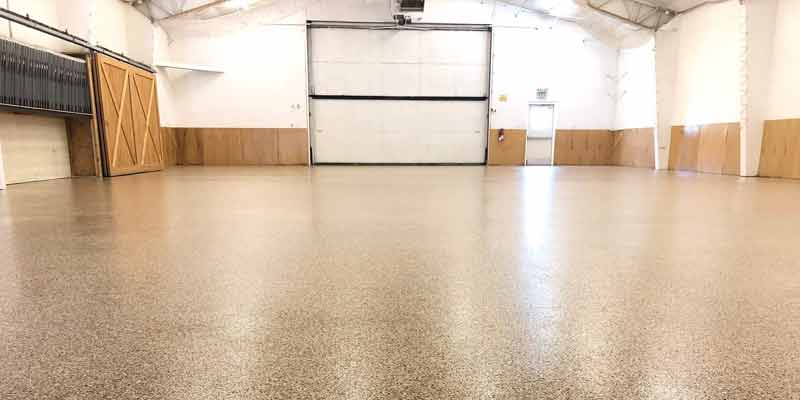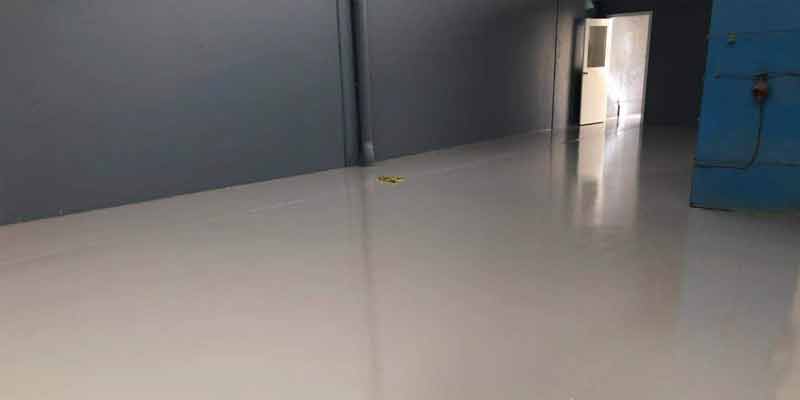Table of Contents
Between Epoxy Floor Thickness Levels

If you are considering epoxy flooring for your home or business, you may be wondering about the different thickness levels available. Epoxy flooring is available in various thicknesses, each with its own advantages and disadvantages. In this article, we will take a look at the main differences between epoxy floor thickness levels to help you choose the right option for your needs.
What is Epoxy Flooring?

Epoxy flooring is a type of floor coating that is made up of two parts: a resin and a hardener. When these two parts are mixed together, they create a tough, durable surface that can protect your floor from wear and tear. Epoxy flooring is commonly used in industrial and commercial settings because it can withstand heavy traffic and resist spills and other liquids.
Why Does Epoxy Have Different Thickness Levels?

The thickness of epoxy flooring varies depending on the type of epoxy and the intended use. For example, thicker epoxy is often used in industrial settings because it can withstand more wear and tear. Thinner epoxy is often used in residential settings because it is less likely to show imperfections on the floor.
What Are the Different Levels of Epoxy Floor Thickness?
There are three primary levels of epoxy floor thickness: thin, medium, and thick.
Thin Epoxy Flooring
Thin epoxy flooring is typically between 2-4 millimeters thick. This type of epoxy is often used in residential settings because it can provide a durable surface without being too heavy or difficult to install. A thin epoxy is also a good option for floors with a smooth surface.
Medium Epoxy Flooring
Medium epoxy flooring is typically between 4-6 millimeters thick. This type of epoxy is a good middle ground between thin and thick epoxy. It is durable enough to withstand heavy traffic but not so thick that it is difficult to install. Medium epoxy can be used in both residential and commercial settings.
Thick Epoxy Flooring
Thick epoxy flooring is typically between 6-8 millimeters thick. This type of epoxy is often used in industrial settings because it can withstand the heaviest traffic and resist the toughest spills and stains. A thick epoxy is also a good option for uneven floors or ones with many imperfections.
How Do I Choose the Right Epoxy Floor Thickness for My Needs?
The best way to choose the right epoxy floor thickness for your needs is to consult with a professional. A professional will be able to assess your floor and help you choose the best option for your needs. If you are looking for a durable surface that can withstand heavy traffic, a thick epoxy may be the best option. If you are looking for an easy-to-install surface that is less likely to show imperfections, a thin epoxy may be ideal.
What Should I Consider Before Installing Epoxy Flooring?
Before installing epoxy flooring, you should keep a few things in mind. First, make sure you choose the right epoxy for your needs. There are different types of epoxy available, so be sure to consult with a professional to find the best option for your floor.
Second, make sure you prepare your floor properly before installation. Epoxy can be difficult to remove once it dries, so it is important to make sure your floor is clean and free of debris before application. Finally, be sure to follow the manufacturer’s instructions carefully to ensure proper installation.
DIY vs. Professional Installation
Epoxy flooring can be installed by a professional or as a do-it-yourself project. If you are considering a DIY installation, it is important to keep in mind that epoxy can be difficult to work with. If you are not experienced in working with epoxy, it is best to leave the installation to a professional.
Professional epoxy flooring installation companies will have the experience and expertise necessary to ensure your floor is installed properly. They will also have the proper equipment to get the job done right. Professional installation companies typically offer warranties on their work, so if there are any problems with your floor after installation, you will be covered.
If you decide to install epoxy flooring yourself, be sure to follow the manufacturer’s instructions carefully and take your time. Epoxy can be difficult to work with, so it is important to ensure you take the proper precautions. If you are not experienced in working with epoxy, it is best to consult with a professional before beginning the installation process.
Installing epoxy flooring can be a big project, but it is important to make sure you choose the right option for your needs. Be sure to consult with a professional and follow the manufacturer’s instructions carefully to ensure proper installation.
Final Thoughts
Epoxy flooring is a great option for many different types of floors. It is important to choose the right epoxy for your needs and to follow the manufacturer’s instructions carefully to ensure proper installation. If you are not experienced in working with epoxy, it is best to leave the installation to a professional.
Thank you for reading! We hope this article has helped you better understand the different epoxy flooring thickness levels and how to choose the right one for your needs.
